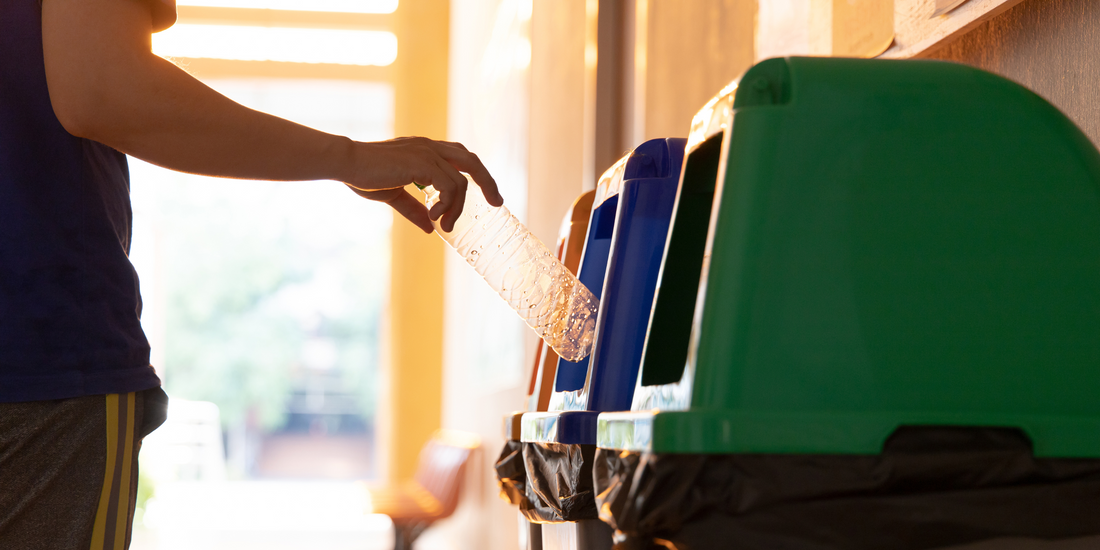
Find out what you can do to help make a difference in our environment every day. Whether you're at home, on the go, in the office, or at school, there are many opportunities to go green by Reducing, Reusing, and Recycling.
Tips for Home
The best place to start making a difference is right in your own home. Learn how you can reduce, reuse, and recycle materials to decrease household waste. The tips below will help you get started.
Lawn and Garden
- Learn to compost at home. Use food scraps, yard trimmings, and other organic wastes to create a compost pile. Adding the compost you make to soil increases water retention, decreases erosion, and keeps organic materials out of landfills.
- Raise the cutting height of your lawnmower during hot summer months to keep grass roots shaded and cooler, reducing weed growth, browning, and the need for watering.
- If you need large lawn and garden equipment such as tillers and chainsaws, you can reduce waste (and save money) by setting up a sharing program with your neighbors.
- When you mow, “grasscycle” by leaving grass clippings on your lawn instead of bagging then. The clippings will return nutrients to the soil instead of taking up space in landfills.
- Donate healthy plants that you want to replace to community gardens, parks and schools.
- If you have a wood burning fireplace, save your ashes instead of throwing them away. Once cooled, wood ashes can be mixed into your compost heap and provide nutrients to your garden.
Home Improvement
- Use insulation made from recycled paper, glass, and other recovered materials.
- Clean and properly store tools, toys and outdoor furniture to protect them from damage and keep them out of landfills.
- Turn off or unplug lights during the day. Doing so will save energy and help your lights last longer.
- Storms can cause power outages. Prevent waste by keeping rechargeable batteries for your flashlights. If you do use disposable batteries, reduce hazardous waste by buying ones with low mercury content.
Moving & Cleaning
- Have a yard sale to find homes for clothes, toys, appliances, and books that you no longer need.
- When moving, use old newspapers to wrap fragile materials.
- Use moving boxes with the highest content of recycled paper and bubble wrap containing recycled plastic. Be sure to recycle packaging materials after your move. Many organizations, such as U-Haul, have places where you can drop of unused boxes for others to reuse.
- Be sure to properly dispose of any non-recyclable items that you won’t be taking with you. Look for household hazardous waste collection days in your community to properly dispose of cleaners, paints, automotive supplies and other hazardous items.
- For cleaning chores, buy reusable mops, rags and sponges. When using cleaning products, use only the amount you need and follow the bottle’s directions for use and disposal.
Tips for Students and Schools
Students, parents, and teachers can all make a difference in reducing waste at school. By practicing the "3 R's" of waste reduction—reduce, reuse, and recycle—we can all do our part.
Green School Supplies
- Think green before you shop. Before starting the new school year, look through last year’s materials. Many items can be reused or recycled.
- Purchase and use school supplies made from recycled products, such as pencils made from old blue jeans and binders made from old shipping boxes.
- Keep waste out of landfills by using school supplies wrapped in minimal packaging, and buying in bulk when possible.
- Save packaging, colored paper, egg cartons and other items for arts and crafts projects. Look for other ways that you can reduce the amount of packing that you throw away.
- Maintain new school supplies. Keep track of pens and pencils. Make an effort to put your things in a safe place every day. This will not only reduce waste, but save you money in the long run.
In the Cafeteria
-
If you bring your lunch to school, package it in reusable containers instead of disposable ones. Carry food in reusable plastic or cloth bags, and bring drinks in a thermos instead of disposable bottles or cartons. Read EPA's Pack a Waste Free Lunch guide for more tips.
-
When buying lunch, grab only what you need. Too often extra ketchup packets and napkins go to waste.
-
Remember to recycle your cans and bottles after you finish eating.
-
Work with your teachers to set up a composting program at school.
-
Make posters that remind students what can be composted or recycled.
Tips for Work
Engage and motivate your coworkers to buy green products and help reduce waste. Learn more about how your office can go green.
In the Office
- Instead of printing hard copies of your documents, save them to your hard drive or email them to yourself to save paper.
- Make your printer environmentally friendly. Change your printer settings to make double-sided pages. Use small point fonts when possible and use the “fast draft" setting when possible to save ink.
- Pay your bills via e-billing programs when possible to save paper.
- Use paperclips (over staples) when possible.
- Reuse envelopes with metal clasps and reuse file folders by sticking a new label over the previous one.
Green Purchasing at Work
- Purchase recycled paper and keep a recycling bin nearby your desk.
- For information on how to buy more recycled-content products for your office, see EPA’s Comprehensive Procurement Guidelines.
- Buy energy efficient items with the ENERGY STAR ® logo or items that are EPEAT registered for the office.
Tips for Communities
Citizens in every community can do many activities to work together and reduce waste. Each of us can make a difference by reducing, reusing, and recycling materials throughout our communities-and encouraging our neighbors to do the same.
eCycling
- Donate your old computers and tablets to a school. Many schools will be able to make good use of your old machine.
- Before replacing a computer that no longer fits your needs, consider enhancing the computer’s capacity by upgrading the hard drive or memory. This can save you money too.
- Donating used (but still operating) electronics for reuse extends the lives of valuable products and keeps them out of the waste stream for a longer period of time.
- Be smart with your smart phone! It contains precious raw materials. Learn how to keep your information and our environment safe when donating your old device.
Starting Community Projects
- On Earth Day, April 22, show your commitment to a clean environment by volunteering for a cleanup effort in your community.
- Organize a recycling drive in your neighborhood or at school. Collect bottles, glass, plastic, newspapers or books and take them to your local recycling center or a charity in need.
- Create a community drop-off site for old computers at a neighborhood school.
- Set up a composting program for your neighborhood or school. It only takes a small amount of land space to collect organic waste into a compost pile. The compost can be bagged and sold for community and school funds.
- Hold a “donation picnic” at your local park or rec center. Participants can eat, talk and bring their old toys, clothes, books, furniture and other items for charitable organizations.
Tips for the Holidays
Holidays are the best time to connect with family and friends, but parties and gift giving often creates extra waste. Learn what you can do to keep your holidays as green as possible.
Giving Gifts
- Think green before you shop the holiday sales. Bring your own reusable cloth bag for carrying your purchases, and try to buy items with minimal packaging and/or made with recycled content.
- Wrap gifts in recycled or reused wrapping paper. Also remember to save or recycle your used wrapping paper. Give gifts that don't require much packaging, such as concert tickets or gift certificates.
- Send recycled-content greeting cards and remember to recycle any paper cards you receive. You can also try sending electronic greeting cards to reduce paper waste.
- Bake cookies or other goodies and package them in reusable and/or recyclable containers as gifts. Homemade goodies show how much you care and help you avoid packaging waste.
- When gifting flowers, consider buying long-lasting silk flowers, potted plants, or live bushes, shrubs, or trees that can be planted in the spring as gifts.
Green Parties and Events
- If you host a party, set the table with cloth napkins and reusable dishes, glasses, and silverware. Also save and reuse party hats, decorations, and favors.
- Be sure your guests know where to properly dispose of and recycle their wastes at your party.
- After holiday festivities, put leftovers in recyclable containers, and share them with family, friends, or others. Donate untouched leftovers from parties to a local food bank or homeless shelter.
- After parties, fill your dishwasher up completely before running it. You will run fewer cycles, which saves energy.
Source: Reducing waste: What you can do | US EPA. (2024, May 9). US EPA. https://www.epa.gov/recycle/reducing-waste-what-you-can-do


